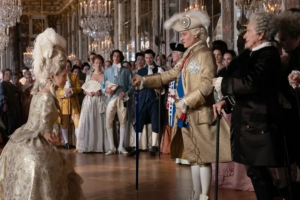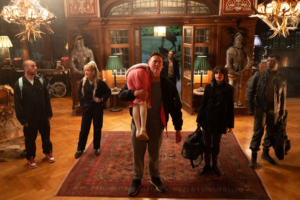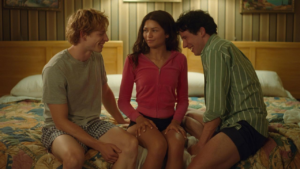The Fabelmans Reviewed by GREG KING
Director: Steven Spielberg
Stars: Michelle Williams, Paul Dano, Seth Rogen, Gabriel LaBelle, Mateo Zoryan, David Lynch, Oakes Fegley, Judd Hirsch, Jeannie Berlin, Sam Rechner, Julie Butters, Keeley Karsten, Sophia Kopera, Chloe East.
The Fabelmans is Steven Spielberg’s poignant and deeply moving and revealing personal memoir about the people and forces that shaped him as one of the most commercially successful filmmakers of our times. Not only is it an ode to the power of cinema, but it is also a coming-of-age story replete with the usual tropes of the genre – bullying at school, the joy and pain of first loves, dysfunctional family life and parental separation, deaths and disappointments. The Fabelmans will invite comparisons to a number of other self-reflective films from filmmakers, such as Francois Truffaut’s 1959 drama The 400 Blows, Barry Levinson’s so-called Baltimore quadrilogy, or Paul Thomas Anderson’s more recent Licorice Pizza, although Spielberg’s film is arguably the more accessible and it clearly captures what the young filmmaker loved about the cinema. Film buffs will be able to spot the many cinematic references throughout the film.
The Fabelmans is anything but a self-indulgent vanity project though as it reveals some raw and painful moments. Spielberg has collaborated with his frequent collaborator, the Pulitzer Prize winning playwright Tony Kushner (Lincoln, West Side Story, etc) on the script and it has an emotional depth and quality that is often missing from his films which seem more concerned with the visual spectacle and the technology than the more introspective human side. The film deals with his complicated relationship with his parents, but especially with the nurturing bond between the young boy and his mother that undoubtedly shaped his creative nature.
Spielberg’s fictional counterpart here is Sammy Fabelman (played as a young boy by Mateo Zoryan), who in 1952 is taken by his parents to see his first movie in the cinema – Cecil B De Mille’s Oscar winning epic The Greatest Show On Earth. The young Sammy becomes obsessed with unpacking the famous train wreck sequence from the film. Using his own train set (a Christmas gift) and his father’s Super 8 movie camera, the young Sammy restages the train wreck and films it. His father Burt (Paul Dano), a computer engineer, indulges Sammy’s fascination with film but only considers it as a hobby that will not lead anywhere. His mother Mitzi (Michelle Williams) is a former piano prodigy who gave up her career when she had a family, but she is supportive of Sammy’s pursuit encouraging him to record family events on Burt’s 8mm camera.
Sammy (played as a teenager relative newcomer Gabriel LaBelle) makes lots of home movies, and as a scout he even earns merit badges for his ambitious epic short movies, including a western and a war film that use many of his friends as extras. But through these small films he hones his craft and his approach to storytelling. Through the lens of the camera, the young Sammy attempts to make sense of the world around him, and he even watches as his parents’ marriage implodes as Mitzi grows more romantically involved with Bennie (Seth Rogen), Burt’s best friend and work colleague.
LaBelle is excellent as the youthful, sensitive and artistic Sammy, and he brings enthusiasm and a boyish energy to the role that conveys his fears, anger and confusion. Williams gives a suitably world-weary performance in the more complex role of Mitzi, who is the most well developed and three-dimensional character here. Her superbly nuanced performance captures Mitzi’ vulnerability and insecurities, and her sense of frustration at how her life has turned out and her yearning to break away from the stifling family life. Dano seems emotionally detached with his quiet performance as Burt, and his role is less showy. Rogen essentially plays it straight and delivers an unusually restrained performance as the sad Bennie. And there is a wonderful and memorable cameo from filmmaker David Lynch who pops up as a cigar chomping, foul mouthed and irascible John Ford, the legendary four-time Oscar winning filmmaker, often regarded as the greatest film director of all time, who offers the young aspiring filmmaker a word of advice. Judd Hirsch brings energy and fire to his cameo as Uncle Boris, who imparts his passion for showmanship to the young Sammy.
The Fabelmans has been nicely shot by veteran Janusz Kaminski (Schindler’s List, etc) whose cinematography lends a nostalgic touch to the material. There is a typically lush score from veteran composer John Williams.
★★★☆



